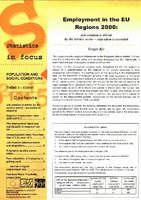| dc.description.abstract | This essay evaluates regional imbalances in the European labour market. It shows how the employment rate varies and develops throughout the EU. Additionally, it examines the impact of education on employment growth. To show how the employment situation varies throughout the EU, the analysis is based on a classification of the regions in six groups according to their employment performance. The starting point of that grouping is the employment rate, i.e. the proportion of employed persons in the total population of the same age. This rate is a benchmark criterion to assess the development of employment. At its Lisbon summit in March 2000, the Council of the EU set the objective to reach average EU employment rates of 70 % (men and women together) and 60 % (women only) by 2010. At its Stockholm summit in March 2001, the Council has set the interim objectives of an employment rate of 67 % (men and women) and of 57 % (women) to be attained by 2005. In addition, the grouping of the regions is based on the employment growth, represented by the annual average rate of employment growth between 1996 and 2000. For the six groups of regions, the following indicators are discussed: the employment and unemployment rates (broken down by gender and by age), the employment growth in the different sectors and according to the educational level of the employees, as well as the proportion of employees working part time. |

